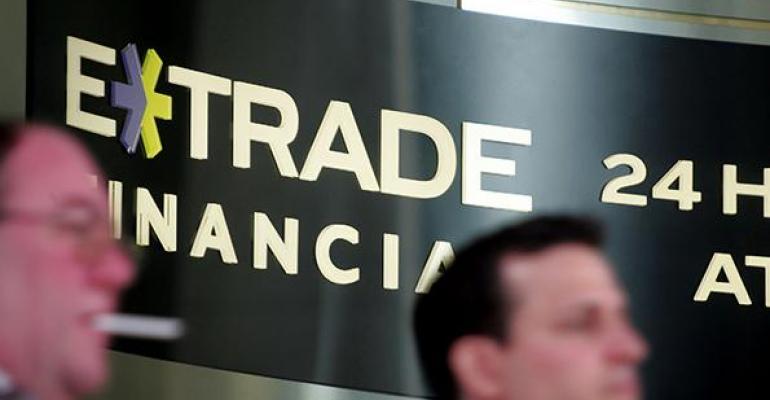E*Trade Financial wants you to know that it’s more than a discount brokerage; it’s an advisory practice.
The company launched Adaptive Portfolio earlier this month, a new service that automatically builds custom portfolios for a fraction of the cost of traditional advisors, but relies on an investment team and advisors to tweak portfolios and help investors. It’s more Vanguard Personal Advisor Services than Betterment, which is why E*Trade doesn’t particularly embrace the “robo advisor” label.
But Mark Hansen, the director of sales distribution at E*Trade, says the company moved into the digital space as early as 2009, before the modern wave of robo advice. The company has since grown from a online-only brokerage to 32 physical branches across the country.
Hansen called Adaptive Portfolio “yet another feather in [E*Trade’s] cap,” building toward a full suite of financial services to serve anyone from the do-it-yourself investor looking for some validation in their trades, to the investor who prefers to delegate their portfolio to a professional. Hansen spoke with WealthManagement.com about E*Trade’s future as a digital advisor and what's to come.
Note: This interview has been edited for length and clarity.
WealthManagement.com: When most people hear E*Trade, they think dotcom-era company designed for do-it-yourself trading, not as much of financial advice. Has that been a challenge for you as a brand?
Mark Hansen: My biggest feeling on this topic is our brand has been strengthened so much and has always been recognized so much as that digital disruptor and the DIY, entrepreneur spirit of our clients. It’s been a blessing and a curse. It’s wonderful to have such strong brand recognition, but to break in and have people see us in a different light, it’s difficult and it takes time. It takes a grassroots effort.
We’re slowly getting there through advertising and media. It really has to do with such strong brand recognition.
WM: Do you see this digital-human hybrid approach as the future of the advice industry?
MH: I definitely do… a nice blend of the technology with the human element. Really providing an experience that logically and impressively combines those two components is truly the future.
To me, robo advisor is a misnomer, that’s why we named our program Adaptive Portfolio. I really tie an advisor to the human element. I’ve yet to see a matrix or a computer be able to be sophisticated enough to really provide the same value that human and live advisors can provide. I’m personally not a huge fan of that “robo advisory” tag. I see our future at E*Trade being a place to go with the best digital and the best human element.
WM: It seems like you are going for a different market than some of the other digital offerings. Is Adaptive Portfolio designed for a more sophisticated, experienced investor rather than a millennial who just started a portfolio?
MH: Adaptive Portfolio is just one pea in the pod. We have so many different offerings. What we are trying to build here at E*Trade is something everyone from a first-time to a sophisticated investor can leverage. To be quite honest, what we really are building here, with our tools and our services, there really is something for everyone up and down that spectrum of sophistication. Our ultimate goal, and I hate to be cliché, is to be that one-stop shop of financial service items for our clients.
WM: But the minimums for Adaptive Portfolio are certainly higher [$10,000] than other digital advice offerings.
MH: We have many different minimums. We have services available for folks that have next to nothing all the way up to multimillions. For instance, we have mutual funds we recommend to clients every day that have no transaction fee with minimums of a dollar. Adaptive Portfolio is a $10,000 minimum, and we have a sophisticated program called Managed Investment Portfolios (MIP for short) that starts at $25,000.
There is also Unified Managed Accounts with a minimum of $150,000, which uses SMAs and portfolios managed by RIAs with individual securities, bonds, ETFs and other investment vehicles.
WM: What’s next for E*Trade as a digital advisor? What services or functionality aren’t available yet that you’re looking to add?
MH: We’re reviewing all aspects—whatever we feel will benefit our client and help meet their goals and objectives. None that I want to be specific on because there’s still some determination on which path, but we really are looking at all areas and all angles to provide our clients with the best service we possibly can.
WM: E*Trade has survived a number of challenges, including the dotcom bubble crash and the recession. How has E*Trade maintained that resiliency, and what lessons can you give the new generation of WealthTech start-ups?
MH: Being early to the digital disruption—everyone wants to think this is a new thing, but not really. We have three decades of experience and this is just another example of how technology is improving the industry and moving more and more to that hybrid type of model.
I think people will really start to see E*Trade as a force in the industry going upstream. We started digital first and are going towards the human element. There are a lot of firms going the opposite way. At some point those two paths are going to cross, if they haven’t already, and people are going to realize that [E*Trade] is a firm that is to be reckoned with and is providing tremendous value to clients.





